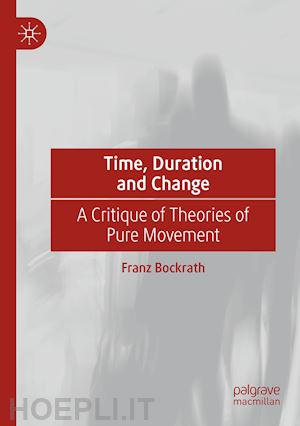

Questo prodotto usufruisce delle SPEDIZIONI GRATIS
selezionando l'opzione Corriere Veloce in fase di ordine.
Pagabile anche con Carta della cultura giovani e del merito, 18App Bonus Cultura e Carta del Docente
This book studies various perspectives in the history of European philosophy on the relationship between time and movement. Ever since the pre-Socratic thinker Zeno of Elea linked time and space to understand bodily movement, his so-called paradoxes of motion have remained unsolved. One of his most important critics, the French philosopher Henri Bergson, criticized the usual connection between time and space and established a new way of understanding time as duration (durée). Whereas Zeno presented an objectivist understanding of time, Bergson emphasized its subjectivist meaning. Both contradictory positions seem incompatible, referring to pure intellect (Zeno) on the one hand or pure sensation (Bergson) on the other. Looking at Hegel's Phenomenology, this book shows that the outer and inner consciousness of time became crucial to his principle of movement and change. In his view, time is an integral part of dialectical processes that are historically substantiated. Hegel sought to subordinate pure concepts and ideas so that they would become indispensable moments of the self knowing spirit. Cassirer appreciated the idealism of coming into being but rejected Hegel's concept of the absolute. Instead, he established his philosophy of symbolic forms, in which the development of different perceptions and conceptions of time - from situational affective experience to the mathematical system of relations - determines the direction of the symbolic formation process. In the end, the sensitive concept of time is replaced by the relational concept of natural numbers, in which all here-and-now experiences are embedded. Finally, Bourdieu attempts to reintegrate symbolic forms into social processes. The book reflects on the concepts mentioned here by discussing their pros and cons in order to shed more light on the relationship between time and movement in European thought.
1. Introduction.- Part I. Motion as a Problem of ‘Pure Thought’ and ‘Pure Perception’.- 2. The Immobility of Being (Zeno).- 3. Being of Motion (Bergson).- Part II. Motion as A Phenomenon of Transition.- 4. Motion as Phenomenal Contradiction (Hegel).- 5. Motion as A Process of Symbolic Formation (Cassirer).- 6. Motion as Logic of Practice (Bourdieu).











Il sito utilizza cookie ed altri strumenti di tracciamento che raccolgono informazioni dal dispositivo dell’utente. Oltre ai cookie tecnici ed analitici aggregati, strettamente necessari per il funzionamento di questo sito web, previo consenso dell’utente possono essere installati cookie di profilazione e marketing e cookie dei social media. Cliccando su “Accetto tutti i cookie” saranno attivate tutte le categorie di cookie. Per accettare solo deterninate categorie di cookie, cliccare invece su “Impostazioni cookie”. Chiudendo il banner o continuando a navigare saranno installati solo cookie tecnici. Per maggiori dettagli, consultare la Cookie Policy.